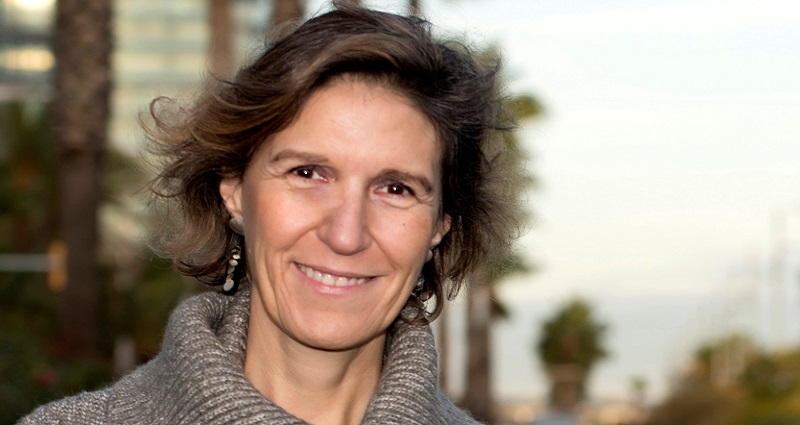Teresa Ferreiro, author of the book “A lump in the breast – You choose how to deal with it”, is the creator of the Soul Reconnect program developed and specifically aimed at patients with breast cancer to accompany them in the difficult emotional trance that this pathology entails.
At the age of 36 and after suffering an abortion, Teresa was diagnosed with breast cancer and although this could have meant the collapse of her life, after going through a long process of asking questions for which she could not find an answer, it ended up being the beginning of a a totally unknown path that he continues to discover today thanks to his most recent project, Reconnect.
How was Soul Reconnect born?
Well, Soul Reconnect is a project that was born more than a year ago after a very organic process. At the age of 36 I was diagnosed with breast cancer, at that moment I was in shock, I thought that it was not my turn and I did not know where to hold on to continue with my life. There were many questions that went through my mind at that time and I began to search for answers that led me to write a book, “A lump in the breast – You choose how to deal with it.” The book went very well, and after the success I decided to get pregnant, at that moment I realized how difficult it was after having suffered from cancer and I reintroduced myself in the topic of women’s empowerment. It was at that precise moment when I saw the importance of using coaching to help women in the same situation as myself and I decided to study for my doctoral thesis.
Thus, and after twelve years of work, Reconect was born, a quite innovative methodology, which consists of a platform created to reach cancer patients and offer them professional coaching during their process with this disease and afterwards.
And why professional coaching?
Because we believe that the patient, and we speak of leading patients, is a person fully capable of making their own decisions and, above all, of taking charge of their process and their lives. What often happens when we are diagnosed with a disease such as cancer and in many situations in life, is that there are so many people who think that you actually lose control of deciding for yourself and what you want, where you want to go. What are you willing to do? In this way, we accompany the person who has cancer to help them make this disease take on the weight that they want it to have in their lives.
Very often when treating a patient affected by a disease, what is treated is the problem, they are told, “you have cancer”, and the cancer is treated and not the person. We, on the other hand, if we treat the person as a human being with his abilities and focus on how he wants his present to be and his future, on what he wants to create and how he wants to continue advancing. For this, we want to give them tools that allow them to live the present in the best possible way, so that they can build from here the future they want.
What are the main barriers that a woman faces, especially at a young age, when she comes to a doctor and is diagnosed with breast cancer?
One of the most frequent and important, especially if you are a young woman, is the issue of fertility. If it is true that there are currently great advances that can help us get pregnant after having undergone a chemo process. But, the problem is not that there are no solutions, the problem is, sometimes, the reluctance that may exist in the other, that is, if you are young today they already offer you to freeze your eggs, for once you have overcome the treatment of chemotherapy to be able to do an in vitro treatment. What happens is that there are many patients who are afraid, they have to face the fact itself, the difficulty of becoming pregnant and the fear, their own fear and the fear of others. Therefore, the key is how I overcome my fears or how I recognize them and what power I want to give my fear, how I want to face it.
Speaking of motherhood in young women, I imagine that there will be patients who, for personal reasons, do not want to be mothers. What is the greatest concern of this group when they come to you?
Here we would enter the workplace, an issue that we address as a return to working life, a return to a professional career or, in the event that they are people who are not in these situations, a return to getting hooked on life. In these cases, the patients face from fear, once again, to the insecurity to face a job that they left a year ago, or to the doubt of knowing if after a year they want to continue dedicating themselves to the same. Two issues that we try to address from the platform and that, in turn, are very valid questions to address from the company itself, because the best thing you can do with an employee who has breast cancer and the best way to convey peace of mind is being there with her, at that moment, as a company, accompanying her emotionally at each stage of the journey she is going to experience. We are not aware of everything that a person can contribute to a company when they return from having overcome a process as difficult as cancer, that person has a lot to teach, they are very valuable.
You mention the accompaniment of companies, but from what perspective can people from a patient’s environment accompany him in this process?
From coaching what we recommend is not to give advice, it is important to project a positive look on this person in the sense that we believe that attitude is very important, because it is people who choose how they want to live situations and that is, always we can choose and to deny it is to deny our capacities. We are all capable of positioning ourselves in a situation. That said, you have to be very aware of who we talk to and how we talk. For this reason, when faced with a person with cancer, what we advise is that they not give each other advice, that they ask themselves how you are, how I can help you and what you need from me. The person going through the process is strong and can get through it, but they need to see it for themselves, not be told.
In addition to the work you do with the affected people, do you also support their environment?
At the moment we are focusing above all on the person more than anything because the project, as such, is starting now. But, what we do do is train professionals so that they know how to accompany the patient from the first consultation.
Throughout the interview we have mentioned the team of professional and very well prepared coaches that make up the Soul Reconnect team, but do you also work with psychologists?
The first thing I would like to say before answering you is that our couches, in addition to having a specific certification and experience, are people who have had cancer, a fact that seems very relevant to me because it improves empathy with the patient. Now, starting from here, we work with people diagnosed with breast cancer, but who are psychologically healthy, that is, they do not suffer from mental disorders. We work with a person who may be sad for a day or a week, but who does not suffer from depression. The moment we detect a disorder of this type, we refer them to psychologists because, although we do know how to recognize that something is wrong, we are clear that the person who should treat the problem is a professional in that field, a psychologist.
Thank you for keeping these mental health professionals in mind…
Exactly, here the key to success to improve the lives of our patients is to offer a very good service, to offer an excellent service. I work with a great team that is highly trained and if this were not the case, we would not dare to ethically treat the people who come to ask us for help. In the end, we are dealing with very delicate things and we are talking about people, all people are delicate jewels and above all in a situation of vulnerability like this. We are aware of how important it is to be there, be rigorous, be professional, know how to be there and know how to sustain that situation.
Listening to you talk like this about your colleagues, I see that Soul Reconnect is a project full of enthusiasm and teamwork. How do you see or where do you set your sights on this project in the future?
The truth is that the initiative is working so well only in breast cancer that I mainly see it spreading to other types of cancer, and the suffering that all cancers cause is something that we cannot deny. Also, I would love to see it expanding into other languages as well. I don’t know how long it will take, probably less than I think, because things are moving very fast and because it is really generating a lot of interest. In the end, it is something rigorous, that we know works because we have studied it and that it responds to a need that has been aggravated by the pandemic because people have felt very alone and have lost connection with themselves.
We will keep reporting…
–


